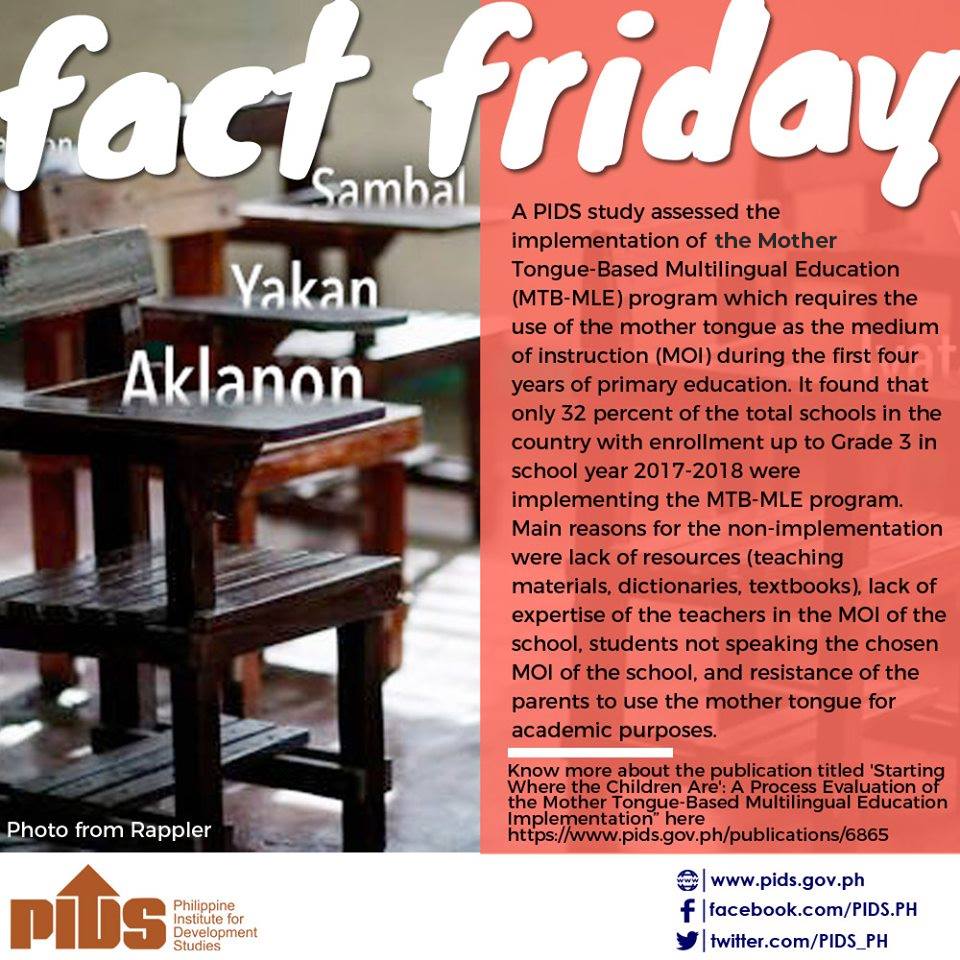Expecting that Mother Tongue-Based Multilingual Education (MTB-MLE) advocates will ignore my letter “Experience of private schools prove the folly of DepEd’s Mother Tongue policy” published in the Nov. 5 issue of this paper, I goaded, through Messenger, the Linguistics Society of the Philippines (LSP); Firth McEachern, the Harvard-educated Canadian who can shame many Ilocanos in fluency in Iloko; and Philippine Institute for Development Studies (PIDS) researcher Jennifer Monje, whose bias for the MTB-MLE is showing, to react to the evidence against the new language policy.
Monje, lead researcher for the PIDS study cited in the letter, “‘Starting Where the Children Are’: A Process Evaluation of the Mother Tongue-Based Multilingual Education Implementation,” and Dr. Diane Dekker, the senior literacy and education consultant of the Summer Institute of Linguistics International who spearheaded the conduct of the Lubuagan Experiment, one of the foremost studies used to convince policymakers to institutionalize MTB-MLE for our elementary grades, attempted to refute my conclusion that the experience of private schools proves the folly of the MTB-MLE. But when I told them to address their defense to this paper, they no longer replied.
Both Monje and Dekker contended that the edge of private schools in English proficiency cannot be used as evidence against the MTB-MLE due to the disparity in socioeconomic status of people who send their children to private schools compared to those who send their children to public schools. Monje said that the advantage established by the PIDS study “does not necessarily mean that learning the mother tongue first stunts their learning of other languages.”
I asked Monje and Dekker if the private schools would retain the edge if the foot was on the other shoe—if they were implementing the MTB-MLE and it was the public schools using the Bilingual Education Policy (BEP). Apparently, the two are not aware, or are in denial, of the disparity in English exposure under the two curricula as follows: The daily time allotment for the English subject in the BEP is 100 minutes versus 43.33 minutes in the MTB-MLE; Filipino and English are the media of instruction in the BEP, while it is the mother tongue in the MTB-MLE except in the English and Filipino subjects; and reading in English is taught in Grade 1 in the BEP while it is only started in the second semester of Grade 2 in the MTB-MLE.
To stress the point: What would be the outcome if pupils who learn to read in English in Grade 3 were pitted against those who start reading in the language in Grade 1 in a contest requiring English proficiency?
Monje’s answer: “If the kids can read fluently in the mother tongue, that’s literacy. If you equate literacy with reading and comprehending in English alone, then more than half of the world is illiterate by your standards.”
Apparently, she is not aware that English is the primary medium of instruction for the latter nine years of the K-to-12 Program and, as such, is our local and international test language. Monje was present during the language forum conducted by the Department of Education (DepEd) and the USAID on Feb. 22, 2021 when it was reported that according to the Early Grade Reading Assessment (EGRA) conducted in 2013 and in 2019, there were more non-readers in 2019 than in 2013. I asked her how the EGRA results tallied with their claim that the MTB-MLE quickens the learning of reading.
No one took up my challenge to all MTB-MLE exponents, starting with the DepEd, contained in the article “Non-readers multiply under the Mother Tongue policy” published in Rappler (Nov. 9, 2020) for the conduct of a joint investigation into the allegation of some public school teachers that the language policy has set back the quality of our basic education by two grade levels. The article debunked an earlier opinion piece, “10 reasons why mother tongues in schools should be saved,” co-written by McEachern.
Dr. Eduardo Alicias Jr., a retired UP Diliman College of Education professor who has written a book picking the MTB-MLE apart, and I asked the LSP last April to engage us in a debate on the impact of the language policy on the learning of Filipino children, but we have yet to hear from the group.
This can only mean that the DepEd is implementing a policy it and its allies cannot defend in a public forum.
Related Posts
Publications
Press Releases
Video Highlights
[No related items]








